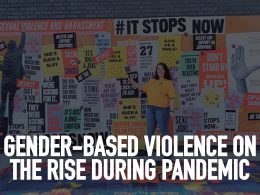By Christian Tello, AS Mexico
Bad Bunny’s new album is causing social furor. With more than 37 million plays it is positioned in the top 10 of the Billboard Global 200 number 1 in global plays on Spotify. A deeply introspective and socially-critical work, it ventures into terrain that few artists in the urban genre have explored with such clarity: the devastating effects of capitalism, the complexities of gentrification, urban displacement and the urgency of climate change. His success is no coincidence, as “Debí Debí tirar más fotos” speaks to a young generation on the brink of scarcity and collapse. By combining his signature musical style with a powerful and forceful message, Bad Bunny has transformed his music into a call to action and collective consciousness.
The artist’s vocation
Bad Bunny – Benito Antonio Martínez Ocasio – is a Puerto Rican singer, songwriter and music producer who has revolutionized the global music industry. Born on March 10, 1994 in Vega Baja, Puerto Rico, he grew up in a working-class family. His mother, a retired teacher, and his father, a truck driver, supported their son’s young career and were instrumental in his inspiration for this new album about Puerto Rico and its people. Bad Bunny stood out for his passion for music. Raised in a household that listened to salsa, merengue and urban music, Benito began experimenting with trap and reggaeton while working as a supermarket bagger. At the same time, he uploaded his songs to platforms like SoundCloud, where he attracted attention thanks to his unique style: a mix of introspective lyrics, social themes and an image that challenged traditional reggaeton gender norms.
His big break came in 2016, when his track “Diles” went viral and attracted the attention of producer DJ Luian. From there, Bad Bunny joined the growing Latin trap scene, bringing his gravelly voice and lyrics that connected deeply with the experiences and emotions of a generation. Songs like “Soy Peor” and collaborations with artists like J Balvin and Cardi B catapulted him to international stardom. Although he himself has admitted that his early lyrics were influenced by certain sexist lyrics of the genre, the evolution of his career saw him move beyond this, adapting his style to both genres and political messages in his lyrics. His friendship with the famous leftist rapper, Residente (René Pérez), and his active participation in the Puerto Rican protests in 2019 played a decisive role in the radical change of his music.
During the 2019 protests in Puerto Rico, Bad Bunny played a prominent role as an activist to mobilize youth and bring global attention to the demands of the Puerto Rican people. These demonstrations emerged after the leak of “Telegramgate,” a private chat between then Governor Ricardo Rosselló and his team, in which misogynistic, homophobic and corrupt comments were exposed. Bad Bunny participated in the demonstrations and collaborated with Residente and iLe on the song “Afilando los “cuchillos”, which became an anthem for the protests. The song channeled people’s outrage against the corruption and abuses of the island’s government.
His active participation in the movement did not end there, as in a September 2024 interview, Bad Bunny expressed his frustration towards the island’s political leaders, stating, “They are employees of the people. This is not their country. They don’t own Puerto Rico by being on Capitol Hill.” He has also openly criticized the imperialist and colonialist role of the United States on the island, denouncing in 2020 that “we have to break the idea that the gringos are gods”. Recently, he has criticized the Fiscal Control Board imposed by the U.S. Congress under the PROMESA Law. In an interview with Time, he highlighted how this board limits the island’s development by prioritizing the interests of American businessmen over the needs of Puerto Rican workers. In songs such as “El Apagón”, from the album Un Verano Sin Ti (2022), Bad Bunny explicitly addresses the effects of American colonialism and how it oppresses Puerto Ricans through the island’s dependence on Washington’s designs and gentrification (a phenomenon we will discuss later).
Not only has he come out in defense of the independence of the Puerto Rican people. In February 2020, during an appearance on “The Tonight Show Starring Jimmy Fallon,” Bad Bunny called attention to the murder of a trans woman in Puerto Rico by wearing a T-shirt with the message, “They Killed Alexa. Not a Man in a Skirt.” This gesture was a statement against transphobia and in support of LGBTQ+ rights. In recent years, through emotionally charged lyrics and metaphors, the Puerto Rican reflects on the challenges faced by marginalized working-class communities as they grapple with urban displacement, environmental degradation and economic inequality.
His latest album, “Debí Tirar Más Fotos,” delves deeper into these issues by addressing inequality, the climate crisis and the alienation generated by an unsustainable capitalist system. Through his lyrics and Puerto Rican cultural references, Bad Bunny not only amplifies the struggles of his people, but also inspires global youth who find in his music an echo of their own frustrations and hopes for a more just future.
“Puerto Rico without Puerto Ricans”. Gentrification and Real Estate Neocolonialism
One of the particular problems afflicting the Latin American working class are the so-called “gentrification” processes. Gentrification is a neocolonial phenomenon in which neighborhoods traditionally inhabited by working class communities undergo an economic transformation due to the arrival of residents with greater purchasing power, mostly foreigners from imperialist countries. The problem, as we have pointed out in previous articles, is not the new residents but the real estate speculation that is generated around investments in infrastructure and services, which increases property values and, consequently, raises the cost of living in neighborhoods that historically belonged to the working class. As a result, workers, unable to afford these increases, are forced to move, losing their homes and, in many cases, their identity.
In Latin America, gentrification has advanced dramatically in cities such as Mexico City, Buenos Aires and Medellin. The process is the same in most cases: multinational corporations, such as Airbnb, invest millions of dollars to buy apartment blocks or social housing in working class neighborhoods, which are then renovated and offered at exorbitant prices to foreigners, mostly digital nomads, tourists or retirees. Access to affordable housing in these cities has become increasingly difficult, as the demand for properties in central areas has driven the growing trend of real estate speculation and the displacement of workers to the peripheries of the cities, erasing our cultural identity to offer a tourist, stereotypical and racist facade of our realities.
In Puerto Rico, this process has intensified in recent years. Between 2014 and 2020, housing prices on the island increased by 23%, while the average rent rose by 7%. This increase has favored gentrification in certain areas, displacing local residents, erasing cultural ties between workers for generations and altering the social composition of neighborhoods. In the album’s videoclip, through the eyes of Jacobo, an old Puerto Rican man, the nostalgia and confusion of an island that no longer belongs to him, or at least is no longer the memory of an island that offered him the best moments of his life, is conveyed. In his words:
“Many things I have lived, I met many people, good people. I went to many countries, almost everywhere in the world, but none like Puerto Rico, or what it was before. Here there was something, I don’t know what, an incredible magic. And there still is… there still is.”
Jacobo, walks the streets of the neighborhood and observes that the salsa afternoons have changed for American barbecue, the popular slang for the Yankee slang of the tourists and even the classic pastramis of his favorite coffee shop for the tasteless sandwiches behind a Starbucks bar. Jacobo enters the food establishment and finds himself frustrated when the cashier speaks to him in English and refuses his cash because the establishment “only accepts cards”. Here was something missing, for a moment Jacobo felt that the incredible magic of that island that saw him grow up and love was over. Suddenly, a man gets up from his seat and offers to pay for Jacobo’s meal, in an act of solidarity the man tells Jacobo “we are still here”, and he confidently and proudly replies “And we will continue here”. This is a powerful slogan against a “Puerto Rico without Puerto Ricans”. In songs like “LO QUE LE PASÓ A HAWAii” and “TURiSTA”, Benito, reflects his commitment to the defense of the historical heritage of Puerto Ricans and the resistance against the forces that seek to irreversibly transform his homeland, the speculators and the bourgeoisie that want to profit from the lives of the people at the expense of their profits.
The lyrics and songs may not be enough to express this social anger but the message is clear: resist, organize and fight. Support community leaders, boycott projects that displace your neighbors and demand accountability from governments that prioritize foreign capital over the human dignity of our people. History has shown that big changes begin with small acts of solidarity and even a small album. We are many, we are strong, and together we can take back our cities, our lands and our future.
“Here they killed people for taking out the flag.
That’s why now I carry it wherever I want, motherfucker.
Nobody will take me out of here, I won’t move from here
Tell him that this is my house, where my grandfather was born” (La MuDanza).
Climate Change: Save the concho frog!
The concho frog, a species endemic to Puerto Rico, also plays a central role in Benito’s video clip, and it’s no coincidence. This small amphibian, a symbol of Puerto Rican biodiversity, has become a powerful metaphor for the fight against the extinction of endemic species and the impact of climate change on the island. In the video clip, the concho frog appears in a solitary environment, highlighting the fragility of its condition in the face of the destruction caused by phenomena such as deforestation, uncontrolled urban development by real estate developers and climate alterations caused by the emission of greenhouse gases. This image is a warning cry about a future in which the disappearance of species such as the concho frog could be the harbinger of an even greater crisis: a Puerto Rico without Puerto Ricans, a world uninhabitable for the human species itself.
Historically, frogs have been an integral part of the Puerto Rican ecosystem and culture. For generations, their nocturnal song has accompanied families on the island. There have been countless occasions that their song forms the backdrop of Puerto Rican nightlife where, over games of jibaro and domino, people sing and laugh with their loved ones. The disappearance of the concho frog would not only be a biological loss; it would be a heartbreaking reminder of how climate change and capitalism are wiping out everything that makes Puerto Rico unique, its “incredible magic.” A world without frogs is a world without memory, without history, and without identity for future generations. Bad Bunny, by highlighting the concho frog, makes a call to collective consciousness about the crisis. He urges us to reflect on how capitalism’s big industries contribute to the climate crisis and how the defense of these species is also the defense of our own survival. Fighting this struggle requires an immediate shift in economic priorities above the survival of the species. It is necessary to protect ecosystems, restore degraded habitats and demand environmental policies through an organized struggle against capitalist corporations and their allies in government. Only in this way will we be able to stop the destructive power of predatory capitalism. Saving the concho frog is an act of political resistance. It means defending a Puerto Rico where the voices of its people and the song of its frogs continue to resonate in harmony and continue to accompany future generations. It is a commitment to life and to the legacy we will leave to those who will come after us. Because a Puerto Rico without frogs would be a Puerto Rico without Puerto Ricans.
Que Viva la Salsa!
Bad Bunny’s latest album represents not only a musical evolution, but a profound homage to salsa, one of the most emblematic genres of Puerto Rican and Latin American culture. By integrating elements of this genre, Benito connects his work with a tradition that has defined the identity of the Puerto Rican people for generations. Salsa, which emerged as an expression of the daily life, struggles and dreams of Caribbean communities, mostly African slaves, is used on the album to remind us that music not only entertains, but also unites, comforts and mobilizes.
This shift towards salsa marks a radical change in Bad Bunny’s trajectory. By incorporating trumpet arrangements, choruses in the style of the great salsa orchestras, and rhythms that evoke Latin legends like Hector Lavoe and Willie Colon, the album not only revalues the musical legacy of Puerto Rico, but tells the whole world that our artistic roots will remain here against the big music corporations of Miami. This gesture is not only artistic, but political: in a world that often looks to the past as something that has been overcome. This album invites us to look at the past not with resignation, but with hope. It teaches us that cultural memory is not a burden, but a fuel to build a better future. Through salsa we share the legacy of those Caribbean slaves as an act of resistance.
“I should have taken more photos of when I had you”: time, love and memories in capitalism.
But undoubtedly, the central message of the album and the most significant is about time, love and memories that we treasure and that capitalism tries to tear away from us with the immediacy of life, the displacement of our neighborhoods and the threat of climate change. During the video clip, and at times in the lyrics of the songs, Benito transports us to the nostalgia of the photographs with our people and the moments that were not captured with photos, the lost embraces not given to people we love who are no longer here. Sometimes memory, what Enzo Traverso calls “redemptive nostalgia” (which he takes up from Walter Benjamin), is the great motivator of social struggles.
The concept of redemptive nostalgia that Traverso develops in his analysis of memory and socialist struggle is deeply related to Bad Bunny’s approach in his latest album. For Traverso, nostalgia is not a romantic longing for a lost past, but a political tool that can reorganize present struggles and revitalize hope for the future. It is a way to connect with the roots, collective experiences and values that have given meaning to the left in its struggle against capitalism, using the past not as a refuge, but as a starting point to build something new.
In the case of Bad Bunny’s album, his rescue of salsa and references to Puerto Rican culture function as an act of collective memory that connects people to their history, their neighborhoods and their cultural roots. This gesture is not merely artistic; it is deeply political. By recovering music that embodies the experiences of previous generations, the artist highlights the importance of remembering who we are and where we come from in order to confront the current crises: neocolonialism, imperialism and climate change.
Traverso and Bad Bunny propose that remembering and loving are radical acts. For Traverso, it is necessary to re-believe in the future through the memories of the past; for Bad Bunny, it is urgent to re-imagine a Puerto Rico where traditions, neighborhoods and its people are not lost in the face of the advance of a dehumanized world. In both cases, the memory is not passive; it is a call to action, to organize and resist with the certainty that a better future is possible. In the end, this connection shows us that socialism, as Traverso puts it, and music, as Bad Bunny interprets it, can come together in a common project: to recover the love for our peoples and turn it into a collective force to transform the present and build a tomorrow where salsa is always danced with joy.
“Enjoying all those things missed by those who leave.
Enjoying the night’ of those things that no longer happen.
I should have taken more pictures of when I had you
I should have given you more kisses’ and hugs’ as many times as I could
Hey, I hope mine never move away
And if I get drunk today, then help me” (DtMF).












